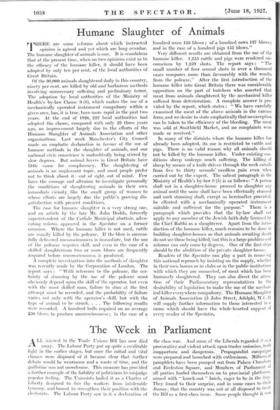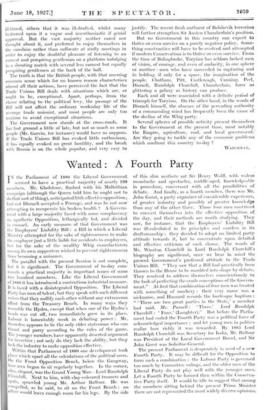The Week in Parliament
ALL interest in the Trade Unions Bill has now died away. The Labour Party put up quite a creditable fight in the earlier stages, but once the initial and vital clauses were disposed of it became clear that further debate would be wearisome and a waste of time,• and .the guillotine was not unwelcome. This measure-has provided a further example of the liability of politicians to misjudge popular feeling. The Unionists hailed it as a Charter of Liberty designed to free the workers from intolerable tyranny, and bound to strengthen their position with the electorate. The Labour Party saw in it a declaration of the class war. And some of the Liberals regarded it as a provocative and violent attack tipOn trades unionism, both inopportune and dangerous: Propagandist campaigns were prepared and launched. with enthusiasm. Millions of pamphlets have, been pumped out from Palace. Chambers and Eecleston. Square, and Members of Parliament of all parties .hurled themselves On to. provincial .platforins, armed with " knock-Out " briefs, eager to be in the fray- They found to their surprise, and in some cases to their dismay, that the country was not at all diSposed to treat the Bill as a first-class issue. Some people thought it was ill-timed, others that it was ill-drafted, whilst many bestowed upon it a vague and unenthusiastic if genial approval. But the vast majority neither cared nor thought about it, and preferred to enjoy themselves in the sunshine rather than suffocate at stuffy meetings in order to enjoy the doubtful pleasure of listening to an earnest and perspiring gentleman on a platform indulging in a shouting match with several less earnest but equally perspiring gentlemen at the back of the • hall: The truth is that the British people, with that unerring common sense which for no known reason characterises almost all their actions, have perceived the fact that the Trade Unions Bill deals with situations which 'are; or ought to be, exceptional. Apart, perhaps, from the clause relating to the political levy, the passage of the Bill will not affect the ordinary workaday life' of the average trade unionist, and most people arc only too anxious to avoid exceptional situations.
The Government now stands at the cross-roads. It has lost ground a little of late, but not so much as some people (Mr. Garvin, for instance) would have us suppose. If the Trade Unions Bill has evoked little enthusiasm, it has equally evoked no great hostility, and the break with Russia is on the whole popular, and very easy to justify. The recent fresh outburst of Bolshevik terrorism will further strengthen Sir Austen Chamberlain's position.
But no Government in this country can expect to thrive or even survive on a purely negative policy. Soine- thing constructive will have 'to be evolved and attempted if modern Conservatism is to.thrive or even survive. From the time of Bolingbroke, Toryism has seldom lacked men of vision, of courage, and even of audacity, in one sphere or another—men who have succeeded in capturing and in holding, if only for a space, the imagination of the people.' Chatham, Pitt, Castlereagh, Canning, Peel, Disraeli, Randolph Churchill, Chamberlain, form as glittering a galaxy as history can produce.
Each and all were associated with a definite period of triumph for Toryim. On the other hand, in the words of Disraeli himself; the absence of the pervading authority of a commanding Mind has frequently been the cause of the decline of the Whig party.
SeVeral sphereS of possible activity present themselves to the Government at the present time, most notably the Empire, agriculture, coal, and local government.' Are they going to tackle any of the economic problems which confront this country to-day ?



























































 Previous page
Previous page